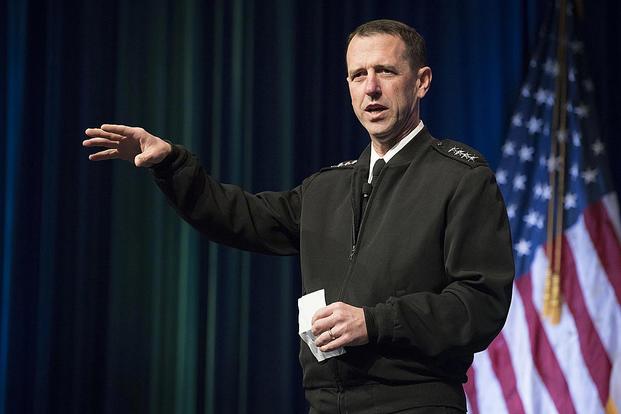Chief of Naval Operations Adm. John Richardson talked up military options against North Korea Friday and also voiced no objection to South Korea's plan to develop a nuclear submarine.
"It's not empty words," he said of President Donald Trump's repeated warnings that the U.S. is prepared to act militarily against North Korea's rapidly advancing nuclear and Intercontinental Ballistic Missile [ICBM] programs.
In an interview Friday with South Korea's Yonhap news agency, Richardson also said the U.S. would not stand in the way if South Korea went ahead with a plan to add a nuclear submarine to its fleet as another deterrent against the North.
During his election campaign, South Korean President Moon Jae-in said his nation needs a nuclear sub to bolster its defenses, and feasibility studies are underway by South Korea's Navy and Ministry of Defense. South Korea currently has about 16 conventional subs.
Richardson said the decision on acquiring a nuclear sub is one that "only the Republic of Korea can answer for itself," but he also pointed out the enormous costs and difficulties of managing a nuclear sub program.
Richardson, a nuclear submariner, said, "I can say from experience that a nuclear Navy requires a significant investment and initial investment, and continued investment in things like manpower, industry, safety.
"And so as any nation goes through the strategic calculus as to whether to develop a nuclear powered warship, whether it's a submarine or whatever, all of that has to be appreciated in the balance," he said.
North Korea would inevitably see a nuclear sub program in the South as cover for South Korea to develop its own nuclear weapons, but the growing threats from North Korean leader Kim Jong-un have forced both South Korea and Japan to reconsider their traditional opposition to the nuclear option.
In South Korea, polls show that 60 percent favor the South's development of nuclear weapons. Nearly 70 percent also want the U.S. to bring back tactical nuclear weapons, which were removed from South Korea in the 1990s.
Japan, as the only nation to have experienced a nuclear attack, has been adamantly opposed to developing its own nuclear weapons, but that opposition could change if South Korea acquired them.
Richardson spoke to Yonhap at the U.S. Yongsan Garrison after meetings with Army Gen. Vincent Brooks, commander of U.S. Forces-Korea and the United Nations Command; Gen. Jeong Kyeong-doo, chairman of South Korea's Joint Chiefs of Staff; and Adm. Um Hyun-seong, commander of South Korea's Navy.
On the North Korean threat, Richardson said, "We're prepared" with military responses, but he echoed U.S. Defense Secretary Jim Mattis in stressing that diplomacy led by Secretary of State Rex Tillerson is the first option.
Richardson said, "We in the military understand that we have to be prepared for any kind of increasing capability that could come from the North, that would threaten us from the North, so that we could prevail and that we provide a firm backstop to the diplomatic and economic efforts that are going on the lead."
At the United Nations on Friday, Tillerson backed off his previous offer to hold peace talks with North Korea without pre-conditions and said that "North Korea must earn its way back to the table."
Tillerson also called out China and Russia for failing to fully implement economic sanctions on North Korea.
He told a Security Council session on North Korea, "Each U.N. member state must fully implement all existing U.N. Security Council resolutions" sanctioning North Korea.
"For those nations who have not done so, or who have been slow to enforce Security Council resolutions, your hesitation calls into question whether your vote is a commitment to words only, but not actions," Tillerson said.
"We particularly call on Russia and China to increase pressure, including going beyond full implementation of the Security Council resolutions," he said.
Tillerson, who reportedly is out of favor with Trump, earlier this week rattled the White House by stating that the U.S. would be prepared to talk to the North even if North Korea refused to give up its nuclear programs as a precondition.
At the Atlantic Council on Tuesday, he said it is "not realistic to say we're only going to talk if you come to the table ready to give up your program. They've too much invested in it. The president is very realistic about that as well."
At the Security Council on Friday, Tillerson said the U.S. still hopes for dialogue with North Korea, but the North must commit to halting its nuclear programs first.
"We have been clear that all options remain on the table in the defense of our nation, but we do not seek, nor do we want, war with North Korea," he said.
"The United States will use all necessary measures to defend itself against North Korean aggression, but our hope remains that diplomacy will produce a resolution," Tillerson said.
-- Richard Sisk can be reached at Richard.Sisk@Military.com.











